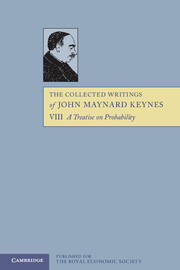Book contents
- Frontmatter
- Contents
- General Introduction
- Editorial Foreword by R. B. Braithwaite
- Editorial Note
- Preface to the First Edition
- I FUNDAMENTAL IDEAS
- II FUNDAMENTAL THEOREMS
- III INDUCTION AND ANALOGY
- 18 INTRODUCTION
- 19 THE NATURE OF ARGUMENT BY ANALOGY
- 20 THE VALUE OF MULTIPLICATION OF INSTANCES, OR PURE INDUCTION
- 21 THE NATURE OF INDUCTIVE ARGUMENT CONTINUED
- 22 THE JUSTIFICATION OF THESE METHODS
- 23 SOME HISTORICAL NOTES ON INDUCTION NOTES ON PART III
- IV SOME PHILOSOPHICAL APPLICATIONS OF PROBABILITY
- V THE FOUNDATIONS OF STATISTICAL INFERENCE
- Bibliography
- Index
23 - SOME HISTORICAL NOTES ON INDUCTION NOTES ON PART III
from III - INDUCTION AND ANALOGY
Published online by Cambridge University Press: 05 November 2012
- Frontmatter
- Contents
- General Introduction
- Editorial Foreword by R. B. Braithwaite
- Editorial Note
- Preface to the First Edition
- I FUNDAMENTAL IDEAS
- II FUNDAMENTAL THEOREMS
- III INDUCTION AND ANALOGY
- 18 INTRODUCTION
- 19 THE NATURE OF ARGUMENT BY ANALOGY
- 20 THE VALUE OF MULTIPLICATION OF INSTANCES, OR PURE INDUCTION
- 21 THE NATURE OF INDUCTIVE ARGUMENT CONTINUED
- 22 THE JUSTIFICATION OF THESE METHODS
- 23 SOME HISTORICAL NOTES ON INDUCTION NOTES ON PART III
- IV SOME PHILOSOPHICAL APPLICATIONS OF PROBABILITY
- V THE FOUNDATIONS OF STATISTICAL INFERENCE
- Bibliography
- Index
Summary
1. The number of books, which deal with inductive theory, is extraordinarily small. It is usual to associate the subject with the names of Bacon, Hume, and Mill. In spite of the modern tendency to depreciate the first and the last of these, they are the principal names, I think, with which the history of induction ought to be associated. The next place is held by Laplace and Jevons. Amongst contemporary logicians there is an almost complete absence of constructive theory, and they content themselves for the most part with the easy task of criticising Mill, or with the more difficult one of following him.
That the inductive theories of Bacon and of Mill are full of errors and even of absurdities, is, of course, a commonplace of criticism. But when we ignore details, it becomes clear that they were really attempting to disentangle the essential issues. We depreciate them partly, perhaps, as a reaction from the view once held that they helped the progress of scientific discovery. For it is not plausible to suppose that Newton owed anything to Bacon, or Darwin to Mill. But with the logical problem their minds were truly occupied, and in the history of logical theory they should always be important.
It is true, nevertheless, that the advancement of science was the main object which Bacon himself, though not Mill, believed that his philosophy would promote. The Great Instauration was intended to promulgate an actual method of discovery entirely different from any which had been previously known.
- Type
- Chapter
- Information
- The Collected Writings of John Maynard Keynes , pp. 295 - 308Publisher: Royal Economic SocietyPrint publication year: 1978



